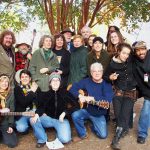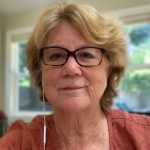Singing with Us, and for Us
olly Near has had an amazing, exemplary life of artistry, performance, songwriting, and activism. The arc of her professional life has spanned more than five decades in a most unique fashion, singing for a more peaceful, equitable, just, and feminist world.
Singing with Us, and for Us
An interview with musician and activist Holly Near.
by David Kupfer.
Published in The Progressive on February 24, 2023.
To subscribe, click here.
Through her music, she has been an insightful storyteller, consistently committed to keeping her work rooted in contemporary activism. Respected around the world for her music and activism, Near has released more than thirty albums and performed in many countries.
Near was born in 1949 in Ukiah, California, into a family that encouraged creativity. At age twenty-three, a half-century ago, she wrote her first feminist song, “It’s More Important To Me.” About the same time, she started Redwood Records to support the release of her first album, Hang In There. Near was one of the first women to create an independent record company, paving the way for others in what had been a completely male-dominated industry.
Throughout her adult life, Near has worked and associated with an incredible array of musicians and artists. She has been recognized many times for her lifelong work promoting social change, including with honors from the American Civil Liberties Union, the National Lawyers Guild, the National Organization for Women, and the National Academy of Recording Arts and Sciences, Ms. magazine, and the Legends of Women’s Music Award.
Q: You’ve had a particularly challenging year, health-wise. Can you share that journey with us?
Holly Near: Earlier in 2022, I slipped on some ice while back East, broke my arm, dislocated my shoulder, and had surgery. After that, I decided to come back West to heal and had my timely colonoscopy. The colonoscopy did not reveal any problems in my colon, but it indicated that I had a rare form of anal cancer: squamous cell carcinoma.
The treatment recommended was radiation and a dose of chemo to make cells more likely to respond to radiation. A five-week run was prescribed. The doctors gave me a full-blast treatment because they only have one shot at it. That was really rough, it brought me to my knees. In the midst of the treatment, the radiation left fractures in my pelvic bone, which required me to walk with a cane as it healed.
Q: What happened then?
Near: In the middle of the treatment, apparently unrelated, I had a small stroke. I found myself on the phone with my niece, and then her mom, Krissy. I’m not sure how that happened, but I was talking without forming words. Krissy said, “Holly, you are having a stroke. Call 9-1-1.”
Once home, the family kicked in and did round-the-clock care until I passed the danger zone of having another more massive stroke. The doctors ordered a heart monitor for thirty days so they could see if there were any abnormalities. Apparently not. But my heart got radiation during my first bout with cancer in 2014, so I must now consciously maintain a healthy heart. I don’t recall anyone telling me that at the time.
Q: How are you feeling today?
Near: I am, as of this moment, cancer-free. It is gone. It will be many months to recover psychologically since the brain has been on “danger, danger” alert with regard to the treatment. PTSD is not unusual. The doctors say I have about a year of recovery and healing in front of me before I return to my old self. But that is not true. I will never return to my old self. That year is gone. It took its toll. The job now is to heal my spirit and accept the new me. This may not be how I imagined my seventy-third year to be, but this is what it is, and it’s best to work with the reality that I’m healing. I am getting stronger.
So it has been a rough 2022. The body is amazing and the spirit even more so, and, thankfully, I am still upright. With the pandemic and semi-retirement from major touring and recording, I find myself asking, “Who am I and what is my purpose in life now?” My life since I was a teenager has been so directed. The goal now is to embrace the clean slate before me and be patient enough to see what comes next. My dad died of an aneurysm when he was my age. My mother died when she was in her late eighties.
Q: What was your parents’ background and their influence on you?
Near: Russell, my father, was from Beach, North Dakota. During the Great Depression, he and his family moved to Minneapolis, and then on to Southern California. He was a party boy and liked to go dancing on Catalina Island. His grandmother Maria Peek had been a socialist and a suffragist, and his great-grandfather Frederic Near a soldier in the Civil War, with red hair and a long, red beard.
Anne, my mother, was raised on Park Avenue in New York City. Her parents, Artemas “Judge” and Dorothy Holmes, were members of the Social Register, and made their money in Street & Smith Publishing. Mom and her twin sister, Ruth, went to Miss Chapin’s School for Girls, and had coming-out parties, which would mean something quite different to them than my coming-out party would mean to me.
Mom didn’t feel at home in the world of high society, so after she graduated from Bennington College, she taught fifth grade at the Professional Children’s School on Broadway in Manhattan, spent time at the Catholic Worker on Mott Street, where she got some of her political education, and attended Commonwealth College in Arkansas—where Lee Hays was on the staff—with the hope of finding out more about the world. Hays later became one of The Weavers. Later, Mom worked with the New Theater in Philadelphia, which put on skits for union meetings and performed plays by Marc Blitzstein and Clifford Odets. She swept floors and pulled curtains. Then she headed for Los Angeles, where she got a job as an electrician at North American Aviation.
There, she met and married Russell, who was a grievance committee man for the union. They were trying to get child care for the new female work force that had come to make airplanes for the war effort. My sister Timothy was born. The bombs were dropped on Hiroshima and Nagasaki, leading my parents to question their continued participation in the war effort. There was no doubt in their minds that they wanted to fight fascism, but killing 30,000 Japanese people in a weapons experiment was genocide.
When more middle-of-the-road leadership took power, Dad lost his job. In search of creative work, they moved north to a ranch in Potter Valley, a small town in Mendocino County, [California]. They had three more kids, started a play school, joined the PTA, and learned how political activism worked in a rural town. There were no unions to organize, but they worked to get corporal punishment abolished in the school system. I can’t say we were red-diaper babies, it was more as if a red shirt had accidentally gotten thrown in the wash with the whites.
Q: What was their involvement with Redwood Records?
Near: Redwood Records really started out as a family affair. My parents agreed to be the “home office.” My dad set up some simple bookkeeping for us, and Mom set up a system for packing and shipping, then worked handling distributor and individual mail orders for albums, and ran the public relations department. She was good at it, efficient and persistent. She even had to deal with marriage proposals that came in to me through the mail, from women! This was around 1975, when an article about me appeared in People magazine where I came out as a lesbian. The next day, my mother went into downtown Ukiah and walked around, in case anyone had any problem with this. Damn, she was a great woman.
Q: You and Ronnie Gilbert had an especially close friendship and professional alliance. I believe you were personally responsible for helping her have a renaissance in her own musical career in her later years. How did you come about meeting and then working with her?
Near: I first saw Ronnie perform when I was ten years old in San Francisco. Before I actually met her, I dedicated my 1974 album, A Live Album, to her. As she later shared the story, her daughter, Lisa, phoned her and asked, “Mom, do you know a singer named Holly Near?” She didn’t. “Well, she’s dedicated an album to you.”
Ronnie put off listening to the record. She decided to clean the house while she listened, so as to ease the boredom she had already decided she would feel. She didn’t much like what the folk world of the sixties had produced and preferred the company of theater people. Several hours later, the house was untouched by broom and mop, Ronnie had laughed and cried and played the songs again and again. Something felt different about this music, she told me later.
Soon after, she came to visit me in Ukiah, en route to Canada, where she was living and working with a theater company. Ronnie spent the day with me and my folks. I tempted fate as I sat at the piano and pulled out a few old folk songs. She hummed along but didn’t really sing. I didn’t push it, but as she left, I told her about a women’s music festival that she would drive past as she headed north. She did stop and was astounded by what she saw and heard. We became pals, and then in 1980, a Weavers reunion concert and film were in the works, called Wasn’t That a Time, which I ended up appearing and singing in.
In 1983, Ronnie and I developed a show singing together as a duo that went on a national tour. The concert halls filled with people who crossed generations, cultures, and lifestyle boundaries. Children brought parents to introduce them to Holly Near. Elders brought their children to introduce them to Ronnie Gilbert. Four generations of women came together. Red-diaper babies sat next to upwardly mobile liberals, sometimes they were the same. We were in the midst of a unique, unforgettable coming together of past, present, and future. We subsequently produced for Redwood Records a live album together from those shows, called Lifeline, and two years later, in 1986, we released Singing With You.
Ronnie and I worked with pianist/arranger Jeff Langley, with whom I went to high school and later worked with for a dozen years, writing so many songs together. He recently died and I miss him. He helped us create unique harmonies that stretched beyond simple folk lines. I usually sang melody, so I have to hand it to Ronnie. She learned and carried those harmonies like it was nothing. Jeff knew he was working with two big voices, theatrically trained entertainers, and knew how to get the most out of us. It was great, a powerful reflection of generations of social activism.
We joined Pete Seeger and Arlo Guthrie on a multi-city tour, and Redwood Records released a live album, HARP, recorded at the Universal Amphitheater in Los Angeles. It was an unusual collaboration. Pete and Arlo worked together fairly regularly as did Ronnie and I, but the four of us were not an easy fit. Ronnie and I were big theatrical performers, Pete and Arlo more laid back, but we found a nice balance. It was a hell of a good show.
Q: Can you tell me about the archive you just produced this past December, “Because of a Song”?
Near: “Because of a Song” is an online archive I created that documents the extraordinary feminist and lesbian music that burst forth from the heart of Oakland, California, forty years ago. “Because of a Song” features more than thirty hours of filmed conversation, four short films featuring Linda Tillery, Carolyn Brandy, Mary Watkins, and Melanie DeMore, a curated resource room, a listening room of more than 600 songs in six playlists, a captioned photo gallery of nearly 200 images, and much more. No story is the whole story, we simply leave a trail. The world has always been, and continues to be, changed because of a song!
Q: What are you listening to these days? What is your assessment on the current state and health of the folk music movement?
Near: Music is very personal, so I never make recommendations. However, many people have expressed frustration, asking, “Where is the next generation of political songwriters?” Or, “Why aren’t there any political singers?” To find them one must be willing to look around, listen to people unfamiliar to the ear, take some risk.
In any given recording, artists might present fifteen political songs, or two. For example, in my own work, if someone heard that I was a political artist and bought my recording Crushed!: The Love Song Collection, they might be misled. It is important not to make assumptions about artists. We are a wild bunch who, if we are any good at all, experiment and stretch and adventure away from any given stereotype.
The suggestions found in the listening room of the “Because of a Song” website are windows to what I hope will be some delightful discoveries for you. And this is just a drop in the bucket. Feel free to send in the name of your favorite social change artist!
Q: What’s been your life philosophy?
Near: I have not separated my music from my heart, nor do I separate my ideals from my daily life. I have opened myself up to learning as much as I can about humanity, this mysterious life experience, but I have not related to political work as this list of “causes.” Moment by moment, I have integrated what I have learned into my personal life, personalizing my politics. It has been from this personal place that I have written my songs. And what greater work is there than the art of creation? Life is an immense mural that requires each of us to pick up the brush and paint a bold stroke.
David Kupfer is a San Francisco-born writer whose work has appeared in numerous publications, including The Sun, Bay Nature, Earth Island International Journal, Yes, and, for the past 30 years, The Progressive.



